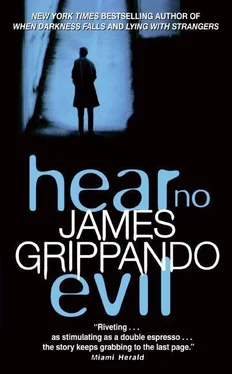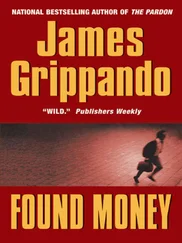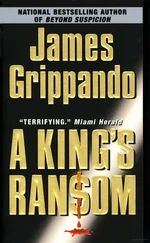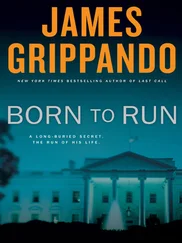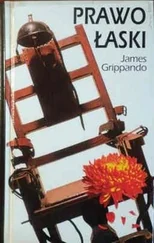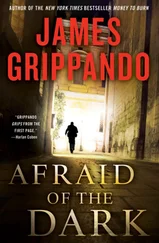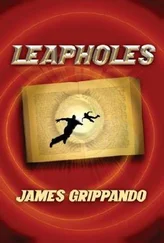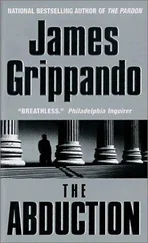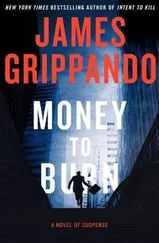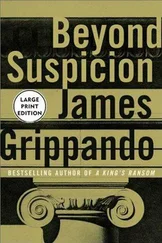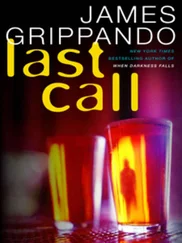“Does he ask about his mother?”
Pintado speared his first glance in Lindsey’s direction, but he didn’t make direct eye contact. “Almost never.”
The dagger wasn’t even directed at him, yet Jack felt it. Lindsey leaned toward him and whispered, “That’s so not true. See how he lies?”
The prosecutor asked, “What kind of a husband was Oscar?”
“He was a good husband. I have to say that he loved his wife very much.”
“Based upon your own personal observations, would you say that she loved him?”
His lower lip protruded, the chin wrinkled. “No.”
“Why do you say that?”
“From the very beginning, I felt that Lindsey was more interested in the Pintado family money than in Oscar.”
Jack knew where this was headed, and he probably could have objected, but there was little to be gained by playing to the jury as an obstructionist lawyer who wouldn’t even let a grieving father talk about his son.
The prosecutor said, “Did anything specific happen in the recent past to shape your views that Lindsey was after the family money?”
“Oscar had a trust fund. The money kicked in three years ago, on his thirty-fifth birthday.”
“I hate to probe into your family finances, sir. But how much money are we talking about?”
He paused, then said, “It was in the millions.”
“I suppose that buys a lot of beer nuts over at the officers’ club in Guantánamo.”
“That was exactly the point. There was really no place to spend that kind of money at Guantánamo. Oscar was a soldier. He lived like every other soldier.” Again, he shot a quick glare at Lindsey. “And his wife lived like every other soldier’s wife.”
“What was their house like in Guantánamo? The physical structure, I mean.”
“It was very modest. Built in the 1940s, I believe. Eleven hundred square feet. No garage, just a little car port on the side.”
“Do you know how long your son planned to live there?”
“I suppose he could have been transferred to another base. But he was just a few birthdays away from twenty years with the Marines, and he had every intention of finishing out his career at Guantánamo.”
“How do you know that?”
“We talked about it in connection with Brian’s schooling. The military has never been willing to provide a Sign Exact English interpreter for Brian’s classroom, so I called in some favors to find a good civilian interpreter who was willing to live on the base at the family’s expense. It was long-term, at least until Brian started high school.”
“So, for Oscar and Lindsey, that seven-bedroom dream home on the waterfront was at least a few years away.”
“That’s true. But Oscar could wait. He loved serving his country. He was a soldier, and he was happy to keep the money in the bank until his job was done.”
“Was Lindsey happy?
He glanced toward the jury, then back. “Maybe you should ask her.”
“Thank you. No further questions,” said Torres.
Jack rose and said, “I’d like a sidebar, Your Honor.”
The judge waved the lawyers forward, and they huddled behind the bench on the side farthest from the jury. Jack said, “Judge, that last question and answer should make your skin crawl. It was so obviously choreographed to elicit the response Mr. Pintado gave: ‘Maybe you should ask Lindsey.’ The defendant is under no obligation to testify. It’s completely inappropriate for Mr. Torres to use his own witnesses to plant a seed in the minds of jurors that my client needs to explain herself on the witness stand.”
“I don’t know what Mr. Swyteck is talking about, Judge. I simply asked a question, and the witness answered as best he could.”
“Oh, please,” said Jack. “You’re talking to a former prosecutor. Are you trying to tell me that you ended the examination of your very first witness with a question that you didn’t know the answer to?”
“All right, that’s enough,” said the judge. “I think Mr. Swyteck has a point. Watch yourself, Mr. Torres.”
“No problem, Judge.” As they turned and headed back to their places, Torres whispered in a voice only Jack could hear, “Didn’t know you were so afraid to put Lindsey up there, Jack.”
“Didn’t know you were so afraid to try and get a conviction without her,” said Jack.
The prosecutor returned to his seat. Jack took his position before the witness. Cross-examining a local legend like Alejandro Pintado would be difficult under any circumstance. The fact that he was the victim’s father made Jack’s job even tougher.
“Mr. Pintado, I also would like to express my sympathy to you and your family.”
The witness looked back at him coldly, no verbal response. Jack moved on. “I want to ask you about this trust agreement you mentioned.”
“What about it?”
“That trust was established exclusively for your son. Not for him and his wife. Am I correct?”
“That’s right.”
“You never had any discussions with Lindsey about that trust, did you?”
“No. Lindsey and I didn’t talk about money.”
“You never sent her a copy of the trust instrument, did you?”
“No, of course not.”
“You never heard her having any discussions about the trust.”
“You mean with Oscar?”
“I mean with anyone.”
Pintado thought for a moment, as if he was beginning to pick up Jack’s implication. “No. Never heard her talk about it.”
Jack would have liked to knock his point home and finish with a question like, So, as far as you know, Lindsey never even knew about Oscar’s trust. But he knew he’d probably get an answer like, Actually, Mr. Swyteck, my lawyer tells me that Lindsey called his office to ask about the trust four times a day for six weeks prior to Oscar’s death.
Jack figured he’d leave well enough alone.
“Mr. Pintado, let’s shift gears and talk about you for a minute. I understand that you’re the founder and president of Brothers for Freedom.”
“That’s correct. One of my proudest achievements.”
“Congratulations, sir. For the benefit of those in this courtroom who have never heard of it, how would you describe the purpose of your organization?”
“We fly humanitarian missions over the Straits of Florida in search of people trying to leave Cuba. Once we find them, we do everything within our legal rights to help bring them to safety in Florida.”
Jack noticed three of the jurors nodding their heads in silent approval. It was hard not to admire what he was doing. But it was Jack’s job to discredit him anyway.
“Mr. Pintado, I have here a copy of a newspaper article that appeared on page two-A of the Miami Tribune some eleven months ago. It talks about your role in Brothers for Freedom. Do you recall speaking to a reporter before this article appeared?”
“Yes.”
“The article quotes you as follows: ‘We don’t want to be part of the Coast Guard’s new agenda, which is to send Cubans back to Cuba. They have become Castro’s border patrol.’ ”
Jack let the quote hang in the air. The silence in the courtroom was palpable.
“Yes, those were my words,” said Pintado.
“You made that statement because the U.S. Coast Guard’s current policy toward any Cuban refugees intercepted at sea is to return them to Cuba. Am I right?”
“That’s right.”
“That policy made you angry, did it not?”
“Of course it did. We’re talking about sending people back to Fidel Castro, a ruthless murderer who once put a man on trial and executed him within five days of his return to Cuba. Many others are sitting in Castro’s prisons, and their only crime is that they left Cuba in search of freedom and got stopped by the U.S. Coast Guard before reaching U.S. soil.”
Читать дальше
